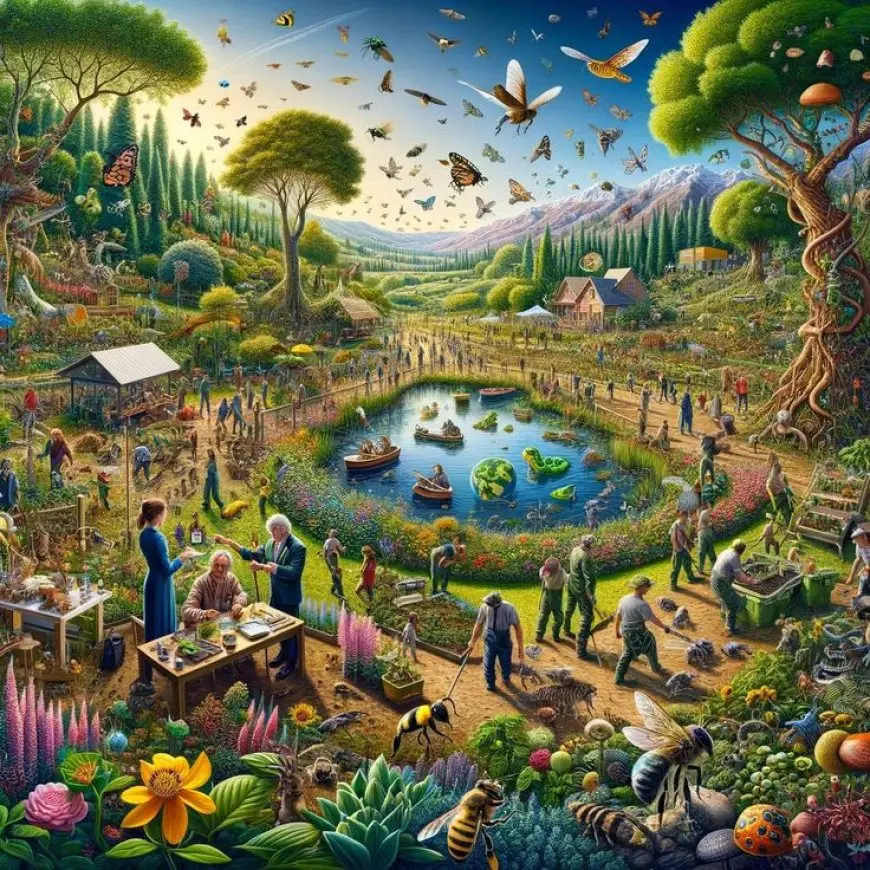What Are Ecosystems, and Why Do They Matter?
What Are Ecosystems, and Why Do They Matter?

Ecosystems are complex networks of living organisms and their physical environment, interacting in a delicate balance to create a functioning system. These interactions involve plants, animals, microorganisms, and non-living components like air, water, and soil. Ecosystems can range in size from a small pond or forest to the entire Earth. Understanding ecosystems and their importance is crucial for maintaining biodiversity, addressing environmental challenges, and ensuring the health of our planet.
What Is an Ecosystem?
An ecosystem is a community of living organisms—plants, animals, fungi, bacteria, and more—that interact with one another and their physical surroundings. These interactions form a web of relationships, where each organism plays a role in maintaining the balance of the system.
Ecosystems include both biotic (living) components, such as animals, plants, and microbes, and abiotic (non-living) components, such as water, air, minerals, and temperature. The flow of energy through these components and the cycling of nutrients are fundamental processes that sustain life in an ecosystem.
Types of Ecosystems
Ecosystems can be classified into two broad categories:
-
Terrestrial Ecosystems: These include land-based ecosystems, such as forests, grasslands, deserts, and tundra. Each of these ecosystems supports different types of plants and animals that have adapted to the specific conditions of their environment.
-
Aquatic Ecosystems: These include freshwater ecosystems, like lakes and rivers, and marine ecosystems, such as oceans, coral reefs, and estuaries. Aquatic ecosystems are crucial for maintaining global biodiversity and supporting various species of fish, plants, and marine life.
The Importance of Ecosystems
Ecosystems play a vital role in supporting life on Earth and maintaining the delicate balance of nature. Here are some of the reasons why ecosystems matter:
Biodiversity
Ecosystems are the foundation of biodiversity, which refers to the variety of life forms in a given environment. Healthy ecosystems support a wide range of species, providing habitats for animals and plants. Biodiversity is essential for the resilience of ecosystems, as diverse species can help ecosystems recover from disturbances such as climate changes or human activities.
Ecosystem Services
Ecosystems provide a range of valuable ecosystem services that are essential for human survival and well-being. These services include:
- Air and Water Purification: Wetlands and forests filter pollutants from water and air, ensuring that ecosystems remain healthy and that water and air quality are maintained.
- Pollination: Bees, butterflies, and other pollinators play a critical role in the reproduction of many plant species, including crops that humans rely on for food.
- Climate Regulation: Forests, oceans, and other ecosystems act as carbon sinks, absorbing carbon dioxide from the atmosphere and helping to regulate the Earth's climate.
- Soil Fertility: Ecosystems like forests and grasslands contribute to soil formation and fertility, which is necessary for growing food and supporting agriculture.
Food and Resources
Ecosystems provide us with essential resources, such as food, water, timber, medicine, and materials for clothing and shelter. Forests, rivers, and oceans are sources of food, including fruits, vegetables, fish, and other natural resources. Many of these resources are renewable, but they must be managed sustainably to prevent depletion.
Natural Disaster Mitigation
Healthy ecosystems help protect communities from natural disasters. For example:
- Mangroves and wetlands act as buffers against storm surges and coastal flooding by absorbing excess water and slowing the movement of waves.
- Coral reefs protect coastal areas from erosion by reducing the impact of waves and storms.
- Forests help prevent landslides by stabilizing soil and absorbing excess water during heavy rainfall.
Cultural and Recreational Value
Ecosystems also have significant cultural and recreational value. Many indigenous communities depend on ecosystems for their traditions and way of life. Additionally, ecosystems provide recreational opportunities for humans, such as hiking, birdwatching, and fishing, contributing to mental and physical well-being.
Threats to Ecosystems
Despite their importance, ecosystems face numerous threats, many of which are caused by human activities. These threats include:
- Deforestation: Clearing forests for agriculture, urban development, or logging disrupts ecosystems, leading to habitat loss, soil erosion, and decreased biodiversity.
- Climate Change: Changes in temperature and weather patterns affect ecosystems, causing shifts in species distributions, altering migration patterns, and threatening the survival of many species.
- Pollution: Industrial activities, agricultural runoff, and waste disposal contribute to air, water, and soil pollution, which can degrade ecosystems and harm wildlife.
- Overexploitation: Overhunting, overfishing, and unsustainable harvesting of natural resources can lead to the depletion of species and the collapse of ecosystems.
- Invasive Species: Non-native species introduced to new environments can outcompete native species for resources, causing ecological imbalances and threatening local biodiversity.
Conservation and Protecting Ecosystems
Protecting ecosystems is essential for maintaining biodiversity, ecosystem services, and the overall health of the planet. There are several strategies that can help conserve and restore ecosystems:
- Protected Areas: Establishing national parks, nature reserves, and wildlife sanctuaries helps protect ecosystems from human interference and preserves biodiversity.
- Sustainable Practices: Adopting sustainable farming, fishing, and forestry practices helps prevent overexploitation of resources and reduces the impact on ecosystems.
- Restoration Projects: Ecological restoration projects aim to restore degraded ecosystems by replanting native vegetation, cleaning up pollution, and reintroducing species that have been lost.
- Community Involvement: Engaging local communities in conservation efforts ensures that they have a vested interest in preserving ecosystems and can contribute to sustainable management practices.
Ecosystems are the foundation of life on Earth, providing the resources and services we rely on for survival. They support biodiversity, regulate the climate, and offer cultural and recreational benefits. However, human activities are threatening these vital systems, making it essential that we take action to protect and restore ecosystems around the world. By understanding the importance of ecosystems and their delicate balance, we can work together to ensure a sustainable future for generations to come.







